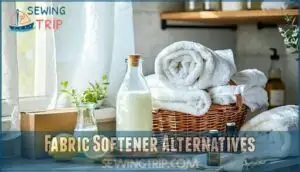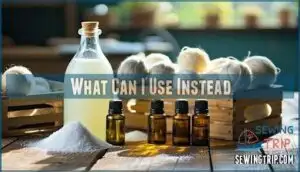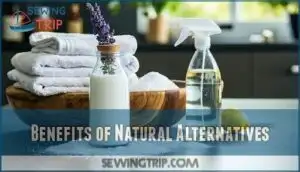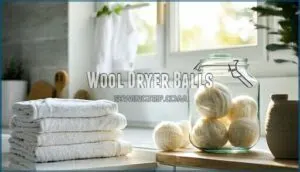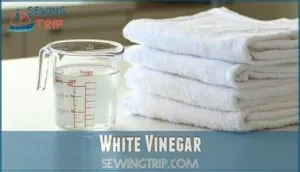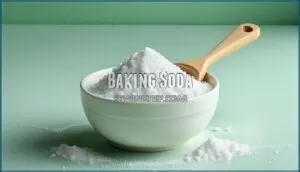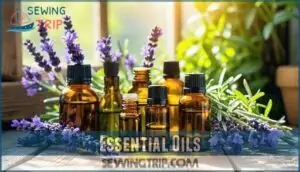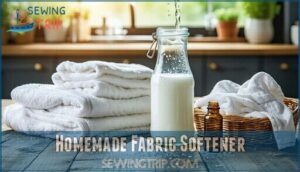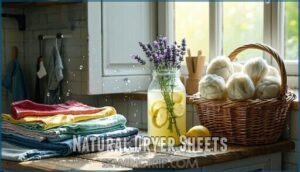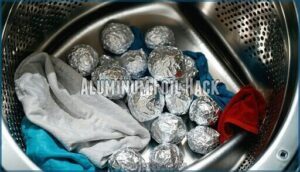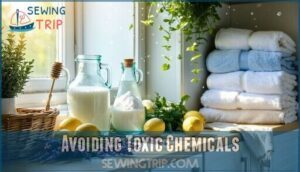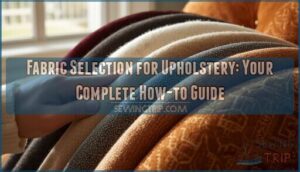This site is supported by our readers. We may earn a commission, at no cost to you, if you purchase through links.
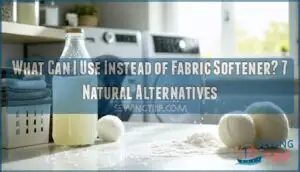
White vinegar is a favorite—just add half a cup to your rinse cycle to soften clothes and reduce static. Baking soda works too; it balances pH and leaves fabrics feeling fresh.
Wool dryer balls are another great pick—they fluff your laundry, speed up drying, and prevent static without any chemicals. For a light scent, toss in a few drops of essential oil.
These simple swaps aren’t just eco-friendly—they’re also kinder to your skin and wallet. Ready to rethink your laundry? Let’s get started with these natural options!
Table Of Contents
Key Takeaways
- Use white vinegar in the rinse cycle to soften clothes, reduce static, and eliminate odors naturally.
- Wool dryer balls are reusable and cut drying time while softening clothes and reducing static cling.
- Baking soda balances pH, removes odors, and leaves fabrics feeling soft and fresh.
- Add essential oils to vinegar or dryer balls for a customizable and chemical-free laundry scent boost.
Fabric Softener Alternatives
If you’re rethinking fabric softeners, there are plenty of natural and effective solutions that can help.
From simple pantry staples to reusable options, these alternatives can soften your clothes without the harmful chemicals, using natural solutions.
Natural Fabric Softeners
Why not trade your fabric softener for a natural swap?
Wool dryer balls soften fabrics, cut static, and last for years—a true bang-for-your-buck solution.
Vinegar fabric softener works wonders too, neutralizing residue concerns while freshening clothes.
Prefer scent customization? Add essential oils for a DIY fabric softener that protects fibers, saves costs, and avoids the hidden pitfalls of chemical alternatives, providing a natural and cost-effective way to soften clothes.
Eco-Friendly Options
Eco-friendly options for a natural fabric softener can make your green laundry routine shine.
These sustainable softening methods are simple yet effective:
- White Vinegar: Softens clothes while being biodegradable and reducing waste.
- Wool Dryer Balls: A reusable, ethical sourcing option that cuts drying time.
- Baking Soda: A great DIY fabric softener that eliminates odors.
- Soap Nuts: Green ingredients that naturally clean and soften fabrics.
Chemical-Free Solutions
Switching to chemical-free laundry solutions keeps your clothes fresh without exposing you to harsh additives.
Natural softeners like baking soda, distilled white vinegar, and wool dryer balls offer toxin-free fabrics while embracing eco-friendly laundry habits.
These sustainable solutions reduce waste, protect sensitive skin, and save money. A DIY fabric softener with essential oils adds a gentle, green cleaning touch to your routine.
Many also find wool dryer balls effective at reducing wrinkles.
What Can I Use Instead
Ever wondered if there’s a fabric softener alternative that’s safer and just as effective?
Natural alternatives like white vinegar, baking soda, and wool dryer balls work wonders without the residue concerns or harsh chemicals of traditional softeners.
Vinegar helps soften fabrics, reduce static, and neutralize odors, while baking soda leaves clothes fresh and soft.
Wool dryer balls also soften and speed up drying time.
For a touch of scent, add a few drops of essential oils to your natural fabric softener.
DIY safety is key—these simple options are gentle on your clothes and wallet, making them a smart fabric softener substitute.
Why stick to chemicals when natural solutions offer better cost comparison and scent preferences?
Give them a try! Soap nuts offer a sustainable option derived from dried berries.
Benefits of Natural Alternatives
Switching to natural alternatives isn’t just better for the planet—it’s safer for your health, too.
Natural fabric softeners protect your skin, save money, and keep your laundry routine eco-friendly—better for you and the planet.
These options are affordable, effective, and free from the harsh chemicals found in most fabric softeners.
Reduced Environmental Impact
When you choose a natural fabric softener, you’re doing the planet a favor.
Biodegradable softeners and eco-friendly laundry practices help reduce waste and protect waterways.
Here’s how:
- Cut down on water pollution by ditching chemicals.
- Embrace eco-friendly packaging to reduce trash.
- Prevent harmful toxins from harming aquatic life.
- Support sustainable laundry habits that truly make a difference.
Improved Health Benefits
Switching to a natural fabric softener doesn’t just help the planet—it’s also healthier for you.
By using nontoxic laundry solutions like essential oils laundry or baking soda, you’ll reduce irritation, support skin health, and enjoy respiratory relief.
Say goodbye to allergies caused by chemical-laden softeners.
Here’s a quick comparison:
| Benefit | Traditional Softeners | Natural Alternatives |
|---|---|---|
| Skin Health | May irritate sensitive skin | Gentle on all skin types |
| Allergy Reduction | Triggers in synthetic scents | No harsh chemicals |
| Respiratory Relief | Can worsen asthma/allergies | Chemical-free laundry air |
Cost-Effective Solutions
You’ll save money sticking with minimalist laundry.
DIY softeners like vinegar or baking soda cost pennies per load.
Bulk ingredients last forever, and reusable options like dryer balls help you sidestep endless fabric softener substitutes.
Forget pricey bottles—these hacks offer long-term savings without skimping on results.
Plus, no more splurging just to soften towels, which is very practical and budget-friendly.
Many sewists also save money by repurposing existing fabrics.
Natural Fabric Softener Options
You don’t need chemical-laden fabric softeners to keep your clothes soft and fresh.
With natural options like wool dryer balls, white vinegar, and baking soda, you can protect your fabrics, your skin, and the planet all at once.
Wool Dryer Balls
Wool dryer balls are a fantastic fabric softener alternative.
Made from ethically sourced wool, they’re reusable for over 1,000 loads and tackle static cling effortlessly.
Here’s why they’re a winner:
- Naturally softens clothes without chemicals.
- Reduces drying time by up to 30%.
- Infuse with essential oils for added fragrance.
- Cost-effective, eco-friendly, and safe for all fabrics.
Many consumers purchase these dryer products online, making them a convenient and eco-friendly choice.
White Vinegar
White vinegar is a fantastic natural fabric softener and fabric softener substitute.
Add 1/4 to 1 cup to your rinse cycle for softer, fresher clothes.
Its odor neutralization powers are unmatched.
Stick to white vinegar types to avoid fabric damage. While cost-effective, vinegar dilution ratios are key for washing machine safety and fabric compatibility, ensuring a cost-effective approach.
Baking Soda
Baking soda is a game-changer for laundry.
As an odor neutralizer, it keeps clothes fresh while acting as a natural fabric softener. This fabric softener alternative gently cleans, reduces residue, and softens water for better detergent performance.
Baking soda laundry also works wonders for stain removal. It’s an affordable, eco-friendly laundry booster that simplifies your routine and protects sensitive skin.
Essential Oils
Essential oils are a fantastic way to infuse clothes with natural scents while skipping harsh chemicals. With endless fragrance alternatives, they’re both eco-friendly and customizable.
Here are five ways to use them:
- Add drops to wool dryer balls.
- Mix oils with white vinegar for a DIY infusion.
- Combine with Epsom salt.
- Test oil blends on fabrics.
- Use organic essential oils.
Many people now buy essential oils online.
DIY Fabric Softener Recipes
You can skip the store-bought stuff and whip up your own fabric softener right at home with simple ingredients.
These DIY recipes are easy, cost-effective, and free from harsh chemicals, making laundry day a little kinder to both your clothes and the planet.
They are also kinder to your clothes, which makes the DIY approach a preferable choice for many.
Homemade Fabric Softener
Crafting a homemade fabric softener is simple and eco-friendly.
Mix 2 cups of vinegar, 20 drops of your favorite essential oil for scent customization, and store it in a jar.
Add 1/2 cup during the rinse cycle for soft, fresh-smelling clothes.
This natural fabric softener saves you money, avoids harsh chemicals, and offers endless DIY ingredient variations to explore.
Using vinegar can also help address fleece absorbency issues and is a great way to make a natural fabric softener.
Natural Dryer Sheets
Swap store-bought sheets for DIY natural dryer sheets! Grab old cotton cloth or t-shirts as your base.
Soak them in vinegar mixed with essential oils for scent infusion. These static cling removers are reusable and cut waste.
Consider purchasing DIY dryer sheets for convenience. Pair with wool dryer balls to amplify softness and ecofriendly laundry benefits.
Bonus: You’ll save money while reducing the environmental impact with these reusable solutions!
Aluminum Foil Hack
Got some aluminum foil? Crumple it into a ball, and voilà—a fabric softener alternative that fights static cling! Toss 1-3 balls into your dryer for a static cling remover that lasts dozens of loads.
- Foil Static Reduction works wonders.
- Foil Ball Longevity saves effort.
- Foil Material Safety is a bonus.
- Gentle on the Foil Dryer Drum.
- Budget-friendly Foil Alternative Materials!
Avoiding Toxic Chemicals
You don’t need to rely on fabric softeners loaded with chemicals that can irritate your skin or harm the environment.
By switching to natural alternatives, you’ll protect your health, your clothes, and the planet all at once.
Dangers of Synthetic Fabric Softeners
Synthetic fabric softeners might seem harmless, but they bring baggage.
Residue buildup leaves your clothes less absorbent and even hinders flame retardants in fabrics.
Fragrances and cationic surfactants can cause annoying allergic reactions.
Plus, there’s a hefty environmental impact—harmful chemicals pollute waterways and harm wildlife.
It’s like paying extra for problems you didn’t ask for, which can be considered a problem.
Health Risks Associated
Using fabric softener might feel like pampering your clothes, but it could harm your health.
Using fabric softener feels luxurious, but hidden chemicals can irritate skin, trigger allergies, and impact respiratory health—choose natural alternatives instead.
Many softeners release chemicals linked to allergic reactions, skin irritation, or respiratory issues like asthma.
Prolonged chemical exposure can even lead to long-term effects.
If you’ve noticed itching or difficulty breathing around laundry, the culprit might be right there in your washing machine.
Environmental Concerns
Fabric softeners might smell inviting, but their environmental impact isn’t.
Toxic runoff, packaging waste, and microplastic pollution harm waterways and wildlife.
Non-biodegradable chemicals contribute to greenhouse gases and long-term damage.
Switching to ecofriendly alternatives can help.
Try these biodegradable options:
- Wool dryer balls
- White vinegar rinse
- Baking soda
- Soap nuts
- Aluminum foil laundry hack, which can significantly reduce the need for toxic runoff.
Making The Switch
Switching to natural fabric softeners is easier than you think and can make a big difference in your laundry routine.
By choosing simple, eco-friendly options, you’ll save money, avoid harsh chemicals, and keep your clothes feeling fresh and soft.
Transitioning to Natural Alternatives
Switching to a natural fabric softener feels like detoxifying your laundry routine.
Say goodbye to chemical sensitivities and hello to sustainable swaps that prioritize family health and cost savings.
Wool dryer balls, white vinegar, and baking soda make great lightweight alternatives.
Check out this quick comparison:
| Alternative | Benefit |
|---|---|
| Dryer Balls | Reduces static cling |
| White Vinegar | Neutralizes odors |
| Baking Soda | Softens fabrics easily |
Tips for Effective Use
Learning how to use your natural fabric softener substitute properly makes a difference.
Keep things simple—measuring matters and timing is key.
- Use the right amount: Start small and increase if needed (don’t overdo it).
- Add homemade fabric softener during the rinse cycle for better results.
- Avoid stiff clothes with natural drying hacks, like wool dryer balls or vinegar spritzes.
Maximizing Benefits and Savings
A smart way to make the most of a fabric softener alternative is thinking ahead.
Focus on DIY effectiveness by sourcing ingredients like vinegar or baking soda in bulk for long-term savings.
Simple laundry hacks, like wool dryer balls, cut drying time and energy costs.
Usage optimization keeps your natural fabric softener cost per load low, which leads to small tweaks, big rewards!
Frequently Asked Questions (FAQs)
What is a good substitute for fabric softener?
Try white vinegar, baking soda, or wool dryer balls to soften clothes naturally.
Vinegar fights static and odors, baking soda boosts freshness, and dryer balls reduce wrinkles.
Plus, they’re budget-friendly and eco-friendly alternatives!
What can you use if you have no fabric softener?
When life throws you a curveball and you’re out of fabric softener, use white vinegar, baking soda, or toss in wool dryer balls.
They soften clothes, reduce static, and save money naturally!
What to do if you run out of fabric softener?
If you’re out of fabric softener, toss in wool dryer balls, a splash of vinegar, or even baking soda.
These alternatives soften clothes, cut static, and save the day, all without harsh chemicals!
They provide a solution to the problem of being out of fabric softener.
How much fabric softener should be used for each load of laundry?
For each load of laundry, use about a capful of liquid fabric softener, roughly 1/4 cup, or follow manufacturer instructions.
For larger loads, add a little extra, but don’t overdo it.
How long should wool dryer balls be felted?
Felt wool dryer balls for about 15-20 minutes in hot water with agitation, then dry them on high heat.
This process binds the wool fibers together, ensuring they’re durable, effective, and ready for use.
Can essential oils be added to other fabric softener alternatives?
You’ll love this—essential oils can turn natural softeners like vinegar or wool dryer balls into fragrant powerhouses.
Just add a few drops for a dreamy scent boost without the harsh chemicals of commercial fabric softeners.
How often should fabric softener alternatives be replaced?
You’ll need to replace natural fabric softener alternatives like vinegar or baking soda with each wash.
Wool dryer balls last months or even years, but their effectiveness dips after extended use—replace when they stop softening.
This will ensure you maintain the effectiveness of your natural fabric softener alternatives, like using vinegar.
How do fabric softeners impact specific fabric types?
Fabric softeners can damage moisture-wicking fabrics, reduce towel absorbency, weaken fibers, and increase flammability in cotton and polyester.
They also create residue buildup, impacting the appearance, breathability, and performance of many fabric types.
Are there risks using fabric softeners on baby clothes?
Using fabric softeners on baby clothes can leave chemical residue that irritates sensitive skin, reduces fabric absorbency, and may interfere with flame retardant properties.
Safer options include natural alternatives like vinegar, wool dryer balls, or baking soda.
What is the chemical structure of fabric softeners?
Isn’t it wild how tiny molecules can make a big difference?
Fabric softeners often rely on cationic surfactants—positively charged molecules—that coat fibers, reduce friction, and add softness.
Think of them as conditioners for clothes!
Conclusion
Switching to safer, smarter softener substitutes is simpler than you think.
Whether you pick white vinegar, baking soda, or wool dryer balls, these natural options save money, protect your skin, and keep your laundry feeling fresh.
Plus, they cut down on waste and harsh chemicals, making your routine eco-friendly too.
So, when you’re asking, “What can I use instead of fabric softener,” know you’ve got plenty of powerful, natural alternatives ready to give your clothes extra care.
- https://www.researchgate.net/profile/Jessie-Chen-Yu/publication/332407047_Effects_of_Household_Fabric_Softeners_on_Flammability_of_Cotton_and_Polyester_Fabrics/links/5cb2bc1e299bf1209764557d/Effects-of-Household-Fabric-Softeners-on-Flammability-of-Cotton-and-Polyester-Fabrics.pdf
- https://vtechworks.lib.vt.edu/server/api/core/bitstreams/845e0dad-6fec-4542-b289-47f2be884484/content

